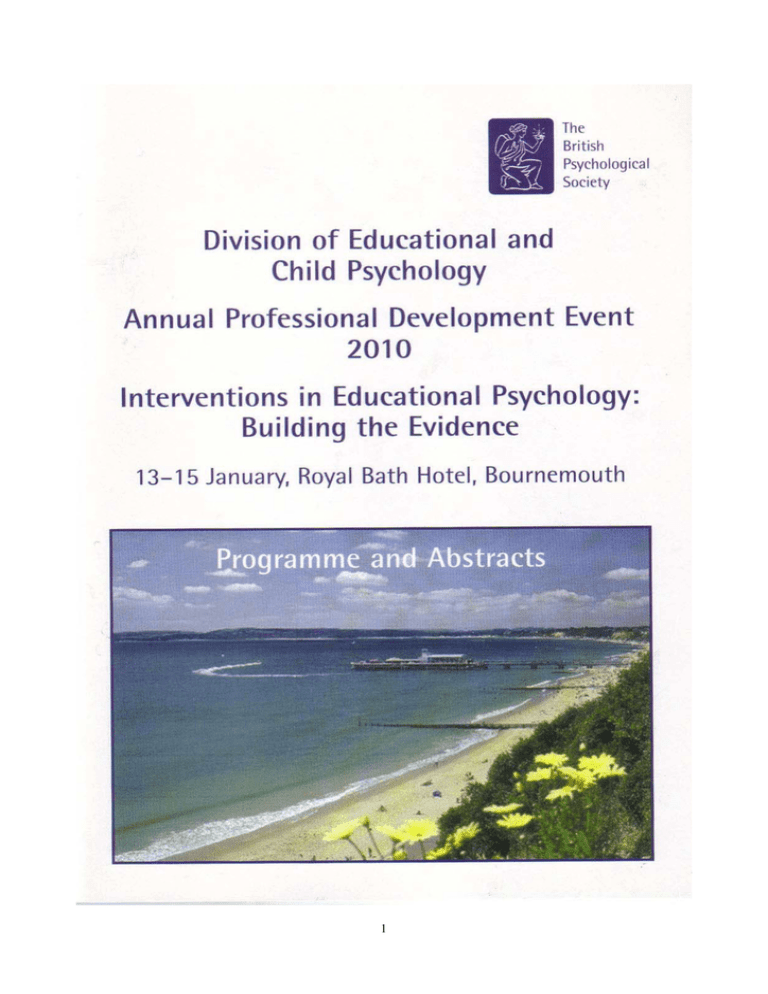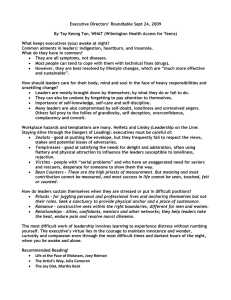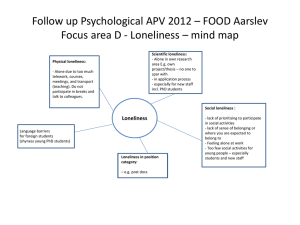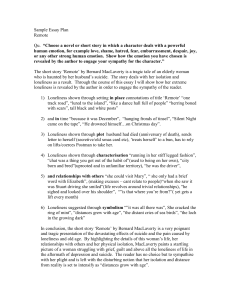1
advertisement

1 DEdPsy symposium at the DECP Annual Professional Development Event 2010 Title and theme of the Symposium: Challenges that many pupils face: EP practice beyond individuals and small groups Symposium organisers: Tony Cline and Seán Cameron (University College London) Symposium summary: Attempts to apply psychology to large-scale problems in the education sector have yielded mixed results. Some initiatives, like the use of ability testing to decisionmaking about which pupils should be allocated to selective secondary schools, created more problems than solutions. But there have been more recent local authority initiatives for which have gratifyingly positive outcomes have been reported for large cohorts of children, such as the East Dumbartonshire literacy programme. This symposium seeks to demonstrate that the creative use of applied psychology can make positive contributions to the understanding and management of problems (and possibilities) of young people and support important Every Child Matters outcomes like ‘enjoy and achieve’, ‘being healthy’ and ‘staying safe’. As the importance of psychological research and theory becomes increasingly recognised, Educational Psychology practitioners are likely to be come more involved in the implementation, evaluation and development of interventions ‘for the many’ and this long-heralded paradigm shift is likely to have major implications for professional training and practice. Symposium topics: • Introductory remarks: Learning from our history. Presenter: Tony Cline UCL). • Seminar 1. Activating Children’s Thinking Skills. Presenter: Dr Jessica Dewey (Harrow and UCL). • Seminar 2. Children’s perceptions of loneliness. Presenter: Dr Maureen Liepins. (Independent Consultant EP). • Seminar 3. Psychological processes during primary-secondary school transition. Presenter: Dr Michelle Sancho (West Berkshire and UCL). • Closing remarks: Looking to the future: EP practice beyond individuals and small groups. Presenter: Dr Seán Cameron (UCL and Independent Consultant EP). Note that Tony Cline’s introductory remarks and Seán Cameron’s closing remarks will each last no more 5 - 10 minutes and the presentations by Jessica Dewey, Maureen Liepins and Michelle Sancho will each last no more 15 - 20, allowing a period of 10 20 minutes for questions and discussion at the end. 2 Introductory remarks: Learning from our history Tony Cline (UCL) Objectives This short introduction will place the symposium in a historical and political context. Background The history of professional educational psychology can be seen as moving repeatedly between a broad focus on the application of psychology to the education of all children and a more targeted focus on its application to the needs of exceptional individuals. There have also been changes over time in the relative weight given to the theoretical underpinnings of the discipline in the psychology of education, developmental psychology, social psychology and psychometrics. Key points Historical shifts of focus in the practice of professional educational psychology will be illustrated with examples from national and local reports and surveys since 1965. Over the same period key concepts from applied academic research in educational psychology have had some influence on schools and the education service, but the paths of influence of the two have rarely operated in parallel. Conclusions It will be argued that current capacity building within the profession, confusion in school structures, in the curriculum and in pedagogy, alongside rapid change in children’s services, mean that the present is a good time to recapture a professional focus on the many and not the few. 3 Activating Children’s Thinking Skills (ACTS): The evidence of effectiveness of an Infusion approach to teaching thinking in Primary Schools Jessica Dewey (Harrow EPS and UCL) Objectives To investigate the impact of an infusion methodology, Activating Children’s Thinking Skills (ACTS), on the cognitive, social and emotional development of children in Year 4-6 in primary schools. Design A quasi-experimental design was used with pre-, post- and delayed post-tests to ascertain changes in children’s cognitive abilities, self-perceptions and social/behavioural skills using quantitative measures. In addition qualitative techniques were used with pupils and teachers to evaluate effectiveness. The study was a 2-year intervention evaluation given the previous research indicating at least 2 years is necessary to generate cognitive change in children. Method The study involved 404 children from 8 primary schools in 1 local authority. These were divided into 160 in the experimental group and 244 in the waiting list control group. In this manner the experimental group received the ACTS intervention for a 2year period, which allowed comparison with the waiting list control, which received, ACTS for a 1-year period. Results The experimental group made significantly greater gains in cognitive ability skills on the Cognitive Abilities Tests (CATs) over a 2-year period compared to the waiting list control. Qualitative data demonstrated a positive impact on children’s social and emotional development. In addition, teacher professional development was reported to be enhanced. Conclusions This research indicated that children’s cognitive abilities can be developed following a 2 year period of the ACTS infusion intervention. While some positive effects were evidenced on the social and emotional development of children, further study will be necessary to examine these in more detail. 4 Children’s perceptions of loneliness Maureen Liepins (Independent Consultant EP) Objectives The objective of this study was to seek evidence for developmental trends in the content of primary school children’s language about loneliness. Four research questions were addressed: 1. How do children of primary school age in the UK describe loneliness? 2. Do they differentiate feeling lonely from being alone? 3. How do children describe loneliness as experienced in school? 4. How do descriptions and attributions of loneliness vary in children of different ages? Design The study was designed to elicit and analyse children’s language about loneliness. Direct questions about loneliness were used in contrast to the indirect methods employed in the few studies published to date about loneliness in children. Method 85 children aged between five and ten years in three primary schools were interviewed individually at school about their ideas about loneliness. A structured interview schedule with mainly open-ended questions was used. A content analysis of their responses was made in relation to the research questions. Results The children described loneliness as a negative experience and a multidimensional phenomenon, experienced in a range of locations including school. Some developmental trends were identified and evidence was found of children’s ability to describe psychological loneliness. Conclusions The children talked about loneliness associated with social and/or psychological factors, but they expressed limited ideas about how to deal with loneliness. These findings have implications for the promotion of emotional competence within and beyond the school context and for teaching about social interaction and about coping with solitude as well as loneliness. 5 Psychological processes during primary-secondary school transition Michelle Sancho (West Berkshire EPS and UCL) Objectives This presentation reports on research that investigated children’s views and experiences of a sense of belonging following transfer to secondary school and their experiences of their new school following transfer. Previous research has demonstrated that transition from primary to secondary school can have negative effects on children’s learning. Whilst key factors have been identified which influence transfer, little research has addressed psychological processes during transition. Design Thirty primary school children aged 10-11 years due to attend the same primary school in Year 7, were interviewed in small groups in five focus groups. Themes were derived from these focus groups and ten of the pupils were selected for individual interviews following transfer to secondary school. Method Children’s views and experiences were explored through individual interviews after their first few weeks at their new school. The transcripts were analysed using Interpretive Phenomenological Analysis. The interview schedule was derived from themes identified in focus groups conducted whilst the children were in their primary school. Results Qualitative analysis yielded four themes concerning the pupils’ view and experience of transition and a sense of belonging: “school context”, “growing independence and maturity”, “descriptions of belonging”, and “descriptions of someone who does not belong”. Conclusions Children’s descriptions of belonging were found to centre on peer acceptance. The findings have implications for how secondary schools organise transition and create a sense of belonging and community. The research also highlights the potential role of psychologists in promoting psychological interventions during primary-secondary transition. 6 Closing remarks: Looking to the future: EP practice beyond individuals and small groups Seán Cameron (UCL and Independent Consultant EP) Objectives This short concluding session will summarise the main issues arising in this symposium. Background As the focus of EP practice switches to support for broader objectives in education as set out in the ‘Every Child Matters’ outcomes and the aspirations of ‘The Children’s Plan’, it is likely that practitioners will not only have to draw deep from the psychology knowledge base but also find creative ways of applying this knowledge to bigger issues in children’s service. Key points Such a shift is likely to provide challenges but will also offer opportunities for the profession. Building on both the content of the symposium presentations and the contributions from the audience, some of the problems, possibilities and opportunities will be outlined. Conclusions As mentioned in the introduction to this symposium, it will be argued that the present is an opportune time in Educational Psychology practice to recapture a professional focus on the many. 7



